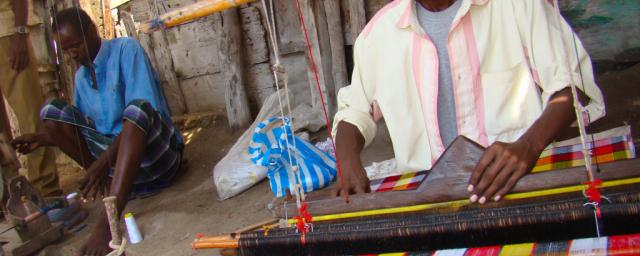
Abbas Ali owns a workshop where traditional clothes are woven in Mogadishu. His workshop employs a handful of craftsmen who produce the brightly colored hand-woven fabrics that are made into different kinds of clothes for both women and men.
The 45-year-old businessman says that there is little demand among local Somalis for traditional locally produced hand-woven clothes but he has discovered opportunities elsewhere. “I have found a good market when I come across tourists and NGO workers who appreciate locally made fabrics. This is because it is difficult to compete with the cheap imported clothes that are a more economical alternative for Somalis.”
An intricate art form

Although originally from Middle Juba, Abbas has lived in Mogadishu for most of his life. “My family is originally from Jilib district. I followed my father here when I was 15 after my parents separated. I am the first born of 20 children in my family.”
The art of weaving is passed on from generation to generation in the Haji family. “My father came to Mogadishu about 30 years ago, set up the weaving workshop and maintained it until last year, when age got the better of him. I took over and have been running the business ever since. I learned the craft from my father and teach it to my children as well.”
Weaving is an intricate art form that requires patience and skill. “It takes half a day to complete a fabric which is then sold to specific clients or resellers.”
The warp and woof of the trade
Although weaving is his passion and family heritage, Abbas says that the business can have its challenges. “There are good days and there are bad days. Weaving needs attention and a lot of patience, both of which many don’t possess. There are many challenges in this business as in any other, but they are not new ones.”
Abbas is troubled by the lack of appreciation of traditional garments and the work that goes into creating them. “It saddens me when a customer approaches me and is not willing to pay what the fabric is worth. Instead, they start to bargain and suggest a very low price that does not even come close to covering the cost of making the fabric.”

Because income from the weaving trade is not regular, Abbas finds it difficult to maintain a steady cash flow in his business forcing him to look for credit. “It’s difficult for me to get credit to buy more supplies and hire more labor. It is also hard to produce more fabric if those in the market have not sold. It’s better to have money available to cushion against such things and plan better for the future. This is why I was very happy that my family was selected to be part of Oxfam’s and Hijra’s E-cash project.”
In August 2012, Oxfam, partner Hijra and money transfer company Nation Link successfully implemented Somalia’s first ever E-Cash livelihoods program. This exciting new project was the first of its kind to be piloted in the country, delivering $150 to over 2,090 urban households in Mogadishu. The program targeted skilled vulnerable urban residents and supported efforts to improve their livelihoods.
Saving valuable time
After the people were registered, they received free mobile phones from Nation Link. They were trained on how to use them and they registered their phone. Once registered, they would receive $150 and they could use it as they deemed fit.
The money was significant in supporting the family business at a time when they were in need. “The money was used to buy some food, medicine and to improve some aspects of the business. I bought thread in bulk and was able to employ another weaver. That generated more income for the business and ensured that there was thread to last for some time.”
Abbas liked the fact that the service is quick. “The E-cash system is very modern and very fast compared to the other one, where we used to line up for a very long time to receive the money. I found this to be a big waste of time as I could be out there, selling my garments.”
Hope looms
Abbas mentions one more benefit to the new system. “I now own a mobile phone. This has improved the way I communicate with my clients and allows me to save their contacts in case there is stock to sell. I can also save money on my phone, instead of keeping it in the house where it can be stolen.” He adds that he is extremely happy to be able to call his family members who also own mobile phones and when he can, send them some money as well.
Abbas has high aspirations for his family and the future of the fabric workshop. “I have big dreams for this shop. I don’t want to let my family down. I hope to be able to employ permanent weavers in the near future and improve the workshop. I would also like to be able to buy bulk stock, store it and maybe even sell it direct. I have hope for this business and intend to work to make it grow.”
Related links
Leaping Heights: Basketball and dreams through E-Cash in Mogadishu